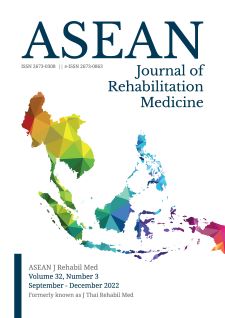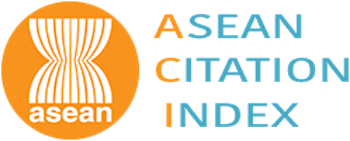Functional Outcomes, Effectiveness and Efficiency of Stroke Rehabilitation Services in Ramathibodi Hospital: A Prospective Descriptive Study
Keywords:
activities of daily living, effectiveness, efficiency, rehabilitation outcome, strokeAbstract
Objectives: To study functional outcomes, effectiveness and efficiency of stroke rehabilitation services.
Study design: Prospective descriptive study.
Setting: Faculty of Medicine Ramathibodi Hospital, Mahidol University, Bangkok, Thailand.
Subjects: Seventy-seven acute stroke patients who were consulted to the Rehabilitation Medicine Department from February to May 2016.
Methods: The patients’ demographic data, Barthel Index (BI), swallowing, communication and cognitive impairments, and the type of rehabilitation services (home-based, outpatient-based and inpatient-based) were recorded and their association with functional recovery was assessed. Rehabilitation effectiveness was measured based on BI gain between the initial and the 12-week follow-up. An inpatient rehabilitation efficiency index was calculated and reported as BI gain per day while in rehabilitation.
Results: Eleven of the patients had an initial BI score of 100. Of the 56 patients having an initial BI ≤ 75, a total of 39, 11, and 6 patients had home-based, outpatient-based and inpatient-based rehabilitation programs, respectively. The levels of mean BI gain (SD) at the 12-week follow-up for those programs were 14.7 (18.6), 25.9 (13.0), 39.2 (10.7), respectively. The mean rehabilitation efficiency index was a gain in BI score of 2.1 points per day. Of the 10 patients with BI between 75 and 99, 9 received home-based rehabilitation and 1 had an inpatient-based rehabilitation program; all had a BI score at the 12-week follow-up of ≥ 95. Among those with dysphagia, recovery of the swallowing function at the 12-week follow-up was found in 30.8% of the patients, but no recovery was found in patients with cognitive impairment.
Conclusions: In moderately to severely disabled stroke patients (BI ≤ 75), inpatient-based rehabilitation is more effective based on BI score gains than either outpatient- or home-based rehabilitation. Patients with mild disability (initial BI > 75) had BI scores ≥ 95 at the 12-week follow-up regardless of the type of rehabilitation provided. The swallowing impairment recovered in one-third of the patients, although cognitive impairment remained.
References
Suwanwela NC. Stroke epidemiology in Thailand. J Stroke. 2014; 16:1-7.
Cohen DL, Roffe C, Beavan J, Blackett B, Fairfield CA, Hamdy S, et al. Post-stroke dysphagia: a review and design considerations for future trials. Int J Stroke. 2016;11:399-411.
Kuptniratsaikul V, Kovindha A, Massakulpan P, Piravej K, Suethanapornkul S, Dajpratham P, et al. An epidemiologic study of the Thai stroke rehabilitation registry (TSRR): a multi-center study. J Med Assoc Thai. 2008;91:225-33.
Utrarachkij N, Reecheeva N, Siriratna P, Thamronglaohaphan P, Chira-adisai W. Functional outcomes of upper and lower limbs after rehabilitation program in sub-acute and chronic stroke patients at Ramathibodi hospital. J Thai Rehabil Med. 2016;26:47-53.
Prasat Neurological Institute. Clinical practice guidelines for stroke rehabilitation. 3rd ed. Bangkok: Tanapress; 2016. p. 43-103.
Lawrence ES, Coshall C, Dundas R, Stewart J, Rudd AG, Howard R, et al. Estimates of the prevalence of acute stroke impairments and disability in a multiethnic population. Stroke. 2001;32:1279-84.
Institute of Geriatric Medicine. Thai version of the mini-mental state examination (MMSE-Thai 2002). Bangkok: Department of Medical Services; 2008.
Wattanapan P, Lukkanapichonchut P, Massakulpan P, Suethanapornkul S, Kuptniratsaikul V. Effectiveness of stroke rehabilitation compared between intensive and nonintensive rehabilitation protocol: a multicenter study. J Stroke Cerebrovasc Dis. 2020;29:1-6.
Sanchez-Rodriguez D, Miralles R, Muniesa JM, Mojal S, Abadia-Escartin A, Vazquez-Ibar O. Three measures of physical rehabilitation effectiveness in elderly patients: a prospective, longitudinal, comparative analysis. BMC Geriatr. 2015;15:142.
Tipchatyotin S, Phankaew U, Kumthornthip W. Upper extremity impairment among acute stroke patients in Siriraj hospital. J Thai Rehabil Med. 2006;16:98-108.
Ministry of Public Health. Development of subacute rehabilitation and lessons learn from implementation within Ministry of Public Health [Internet]. 2016 [cited 2016 Oct 28]. Available from: http://rehabmed.or.th/files/book.pdf.
Kuptniratsaikul V. Conclusions of multi-center study from Thai stroke rehabilitation registry. J Thai Rehabil Med. 2010;20:103-8.
Hsieh YW, Wang CH, Wu SC, Chen PC, Sheu CF, Hsieh CL. Establishing the minimal clinically important difference of the Barthel index in stroke patients. Neurorehabil neural repair. 2007;21:233-8.
Kuptniratsaikul V, Wattanapan P, Wathanadilokul U, Sukontha-marn K, Lukkanapichonchut P, Ingkasuthi K, et al. The effectiveness and efficiency of inpatient rehabilitation services in Thailand: a prospective multicenter study. Rehabil Process Outcome. 2016; 5:13-8.
National Health Security Office. Thai DRGs Version 5.0 [internet]. 2011 [cited 2022 July 1]. Available from: http://www.chi.or.th/csmbs/news/ThaiGrouperV5.html.
Kuptniratsaikul V, Wattanapan P, Wathanadilokul U, Sukonthamarn K, Lukkanapichonchut P, Ingkasuthi K, et al. A multicenter study of efficiency for rehabilitation service: a comparison between Institutes. J Thai Rehabil Med. 2014;24:76-85.
Pattanasuwanna P. Outcomes of intermediate phase post-stroke inpatient rehabilitation in community hospital. ASEAN J Rehabil Med. 2019;29:8-13.
Suksathien R, Chaiyaphan Y, Roongyoosiri C, Muangkham P. Outcomes of short-course inpatient stroke rehabilitation program in tertiary hospital: a pilot study. J Med Assoc Thai. 2015;98:1139-44.
Salter K, Jutai J, Hartley M, Foley N, Bhogal S, Bayona N, et al. Impact of early vs delayed admission to rehabilitation on functional outcomes in persons with stroke. J Rehabil Med. 2006;38:113-7.
Maulden S, Gassaway J, Horn S, Smout R, DeJong G. Timing of initiation of rehabilitation after stroke. Arch Phys Med Rehabil. 2005;86:41-50.
Yingkijsathavorn A, Harnphadungkit K. Quality of life in stroke patients at outpatient rehabilitation clinic, Siriraj hospital. ASEAN J Rehabil Med. 2020;30:123-8.
Suksathien R, Sukpongthai T. Predictors of long-term functional outcomes in acute stroke patients. J Thai Rehabil Med. 2017;27: 96-100.
Kadriye O, Yilmaz YE, Cetinkaya TB, Nil Caglar. Effects of age, gender, and cognitive, functional and motor status on functional outcomes of stroke rehabilitation. Neurorehabilitation. 2009;25: 241-9.
Sun JH, Tan L, Yu JT. Post-stroke cognitive impairment: epidemiology, mechanisms and management. Ann Transl Med. 2014;2:80.
Harini M, Nathania E. The effectiveness of tongue palatal resistance exercise for increasing suprahyoid muscle strength in patients with oropharyngeal dysphagia: a home exercise program during the COVID-19 pandemic. ASEAN J Rehabil Med. 2022;32: 41-3.
Patel M, Coshall C, Rudd AG, Wolfe CDA. Natural history of cognitive impairment after stroke and factors associated with its recovery. Clin Rehabil. 2003;17:158-66.
Zucchella C, Capone A, Codella V, Vecchione C, Buccino G, Sandrini G, et al. Assessing and restoring cognitive functions early after stroke. Funct Neurol. 2014;29:255-62.
Singh S, Hamdy S. Dysphagia in stroke patients. Postgrad Med J. 2006;82:383-91.
Hachioui H, Lingsma HF, van de Sandt-Koenderman ME, Dippel DWJ, Koudstaal PJ, Visch-Brink EG. Recovery of aphasia after stroke: a 1-year follow-up study. J Neurol. 2013;260:166-71.
Downloads
Published
How to Cite
Issue
Section
License

This work is licensed under a Creative Commons Attribution-NonCommercial-NoDerivatives 4.0 International License.






